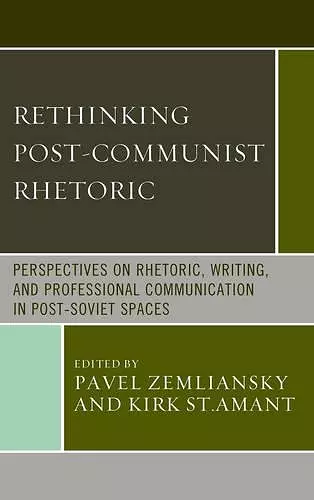Rethinking Post-Communist Rhetoric
Perspectives on Rhetoric, Writing, and Professional Communication in Post-Soviet Spaces
Pavel Zemliansky editor Kirk StAmant editor
Format:Hardback
Publisher:Bloomsbury Publishing PLC
Published:8th Apr '16
Currently unavailable, and unfortunately no date known when it will be back

This collection examines the forces and factors affecting rhetoric, writing, and communication expectations in the nations of the former Soviet Union and the Eastern Bloc. The entries in this collection focus on four interconnected topics or contexts influencing rhetorical expectations and writing practices in these countries. The four contexts are (1) the dynamics of the educational settings in which students learn about the relationships between rhetoric and writing; (2) the professional environments in which students will apply their knowledge of rhetoric and writing upon completing their formal studies; (3) the greater global context that affects the teaching of rhetoric and writing as connected to educational institutions becoming part of a larger and more integrated global community; and (4) the factors and perceptions that affect how students apply and/or expand their foundations in rhetoric and writing to communicate effectively across different forms of media.
By approaching ideas of rhetoric, writing, and communication from the perspective of these four areas, this collection provides readers with a broad foundation for understanding the various overarching and interlocking contexts that affect perceptions of and practices involving communication practices and expectations in the former Eastern Bloc. Additionally, this approach provides researchers, teachers, and students with ideas and approaches that can be used to more effectively engage both with this topic area and with individuals from these nations.
While the collection will appeal to educators, professional technical communicators can find useful information, especially if they specialize in localization or their organizations regularly deal with post-Soviet countries…. I would recommend this collection for libraries and advanced classes in rhetorical and cross-cultural pedagogy. * Technical Communication *
This book provides a unique international perspective on academic writing and the pedagogy and practice of business, technical, and professional communication over the past two decades in Eastern European and former Soviet countries. The breadth of its scope, the rich variety of studies and the analyses, and the depth of cultural and rhetorical insights make this collection a remarkable scholarly achievement that will greatly benefit scholars, teachers, and practitioners for years to come. -- Charles Kostelnick, Iowa State University
For anyone wishing to interact with communication teachers, researchers, or workplace practitioners in post-Soviet spaces, the essays in this collection will offer numerous useful and thought-provoking perspectives. -- Darina M. Slattery, University of Limerick
Rethinking Post-Communist Rhetoric should be required reading for technical and professional communication practitioners, scholars, teachers, and students—and for anyone else who wants to gain an understanding of how to communicate effectively with individuals in the former Soviet republics and the countries of Eastern Europe. The book provides a comprehensive understanding not only of rhetorical expectations and writing practices but also of the institutional, workplace, and geopolitical contexts in which communication occurs. This groundbreaking collection is a much-needed and valuable reference that expands our understanding of the practice of professional communication in the nations of the former Soviet Union and the former Eastern Bloc. -- Madelyn Flammia, University of Central Florida
- Winner of 2017 CCCC Technical and Scientific Communication Award in the category of Best Original Collection of Essays in Technical or Scientific Communication.
ISBN: 9781498523370
Dimensions: 239mm x 158mm x 23mm
Weight: 503g
254 pages